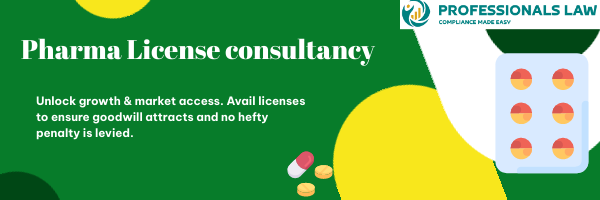It’s not easy to get into the pharma business. Getting the Pharma License is important whether you’re a new business owner who wants to open a pharmacy or a company that wants to make, import, or ship drugs. The Pharma License is one of these important permits.
The governance of pharmaceutical and cosmetic production and distribution is overseen by the Drugs Control Department. In adherence to numerous drug laws, the State Drug Controller regulates the issuance of licenses for both manufacturing and selling pharmaceuticals.
People or businesses can properly deal with pharmaceutical products if they have a Pharma License, which is an official document issued by government regulatory bodies. This license isn’t just a piece of paper; it’s an important part of safety, compliance, and doing business legally in the health field.
The Act also covers the responsibilities of pharmacists and the administration of drugs in medical facilities. Ayurvedic and Unani medicines have since been included under its purview.
Different Kinds of Pharma License
Manufacturing License
For companies that produce medications, regardless of whether they focus on homoeopathic or allopathic formulations, this license is essential. To function lawfully, any organization that produces pharmaceuticals needs to be in possession of this license.
- Sales License
Businesses engaged in the drug trade are categorized into two main categories:
Businesses that sell pharmaceuticals in big numbers to other companies—like retailers or healthcare facilities—instead of to individual customers, must get a wholesale pharma License.
Businesses that sell pharmaceuticals to the general public must have retail pharma license. It covers independent pharmacies, stores selling Ayurvedic products, and any other facility that provides medication to final consumers, including clinics, hospitals, and dispensaries.
- Loan License
The loan license enables businesses who don’t have their own manufacturing infrastructure to make medications at the premises of another licensed manufacturer. Because of the flexibility this arrangement provides, companies can manufacture medications without having to incur the costs associated with owning and running a manufacturing facility.
- Import License
This license is required for any company bringing pharmaceuticals into India, be it for direct sales or for additional production. It guarantees that medications coming from outside meet the same national criteria as goods produced domestically.
- Multiple Drug Permit
This license streamlines operations for companies that run several pharmacies in various states under the same brand name. It streamlines compliance across state borders by guaranteeing uniform licensing procedures for drugstore companies that retain several sites.
Requirement as per Law while applying Pharma License:
Those who want to apply for a Pharma License must fulfill a number of eligibility requirements. While each jurisdiction has its own set of regulations, most areas adhere to a similar set of rules to guarantee the safe handling and distribution of medications.
Having qualified employees in charge of overseeing the distribution and sale of medications is one of the most important qualifying requirements. This guarantees that experts with the required training and expertise are handling the products.
- Appointment of technical person:
In case of Retail Drug License:
In order to be granted a retail pharma license, the applicant needs to hire a registered pharmacist who is either:
D.Pharma (Diploma in Pharmacy) or B.Pharma (Bachelor of Pharmacy) degree.
In case of Wholesale Drug License:
A qualified individual or a pharmacist with a license.
A competent individual can be an undergraduate with four years of relevant experience, or a graduate with at least one year of experience in the medication sales industry.
- Becoming registered with the Pharmacy Council
Making sure the pharmacist or competent individual is registered with the State Pharmacy Council or another approved regulatory organization is an essential stage in the procedure. By registering them, you may verify their credentials as professionals and guarantee that they follow pharmaceutical laws. Typically, the registration process requires the submission of an application fee, experience credentials, and educational records.
- Requirements for Drug Storage and Sales on Premises
To be eligible for a Pharma License, the location where the drugs will be sold and stored needs to fulfill a number of requirements. Creating a safe environment for handling pharmaceutical items is the main goal of these guidelines.
- Minimum Floor Area Requirement
The property must have the minimum amount of floor space required by the local government. This is to guarantee that the company has enough room to handle and store pharmaceuticals in a safe manner.
Generally in all states, premises area should be a minimum of 10 square meters for retail or wholesale. If combined, it should be at least 15 square meters.
- Conditions of Storage
Drugs must be kept in appropriate storage settings, which may include temperature-controlled rooms if needed. To preserve their effectiveness, many medicinal medications need to be refrigerated or kept at a specific temperature.
- Safety Guidelines
To prevent medicine theft or tampering, the premises should adhere to safety laws, which include security measures and fire safety protocols.
Documents Required For Pharma Retail License
1.Property ownership paper of premises
2.Aadhar & Pan
3.Electricity bill / Rent agreement.
4.Fridge bill
5.Degree/ experience certificate
6.10th 12th Graduation marksheet
7.Rent agreement if rented
8. Premises photographs from front and inside.
Documents Required For Drug Loan License
1.Aadhar card and PAN card of all directors,
2.GST certificate
3.Loan license agreement,
4.Retail or Wholesale drug licence In the name of firm
Documents from manufacturer –
1.Manufacturing license
2.technical staff documents
3.Layout plan of premises
4.stability study data
5.product approval copy
FEES
Retail license (Form 20 & 21) | Rs 3000 |
Wholesale license (Form 20B & 21 B) | Rs 3000 |
Manufacturing License (Form 25) | Rs 7500 |
Manufacturing Loan License(Form 25A) | Rs 7500 |
Can I apply for a Pharma License online?
Yes, Pharma licenses are applied on the website of specific state drug authorities and Central Drugs Standard Control Organization(CDSCO) website.
How often does a Pharma License need to be renewed?
It depends on the state and license type, but usually every 1 to 2 years.
What happens if my application is rejected?
You can appeal the decision or reapply after addressing the problems that led to the rejection.
What is a license in pharmaceuticals?
To start a Pharma business, a Pharma License is required. The CDSCO and State Directorate of Drugs Control issues the Pharma License. There are two types of Pharma Licenses for sale, one is Retail Pharma License which is issued to run a retail business of pharmaceuticals , second one is a Wholesale Pharma License which is issued for business of pharmaceuticals at wholesale level, and third one is Drug Manufacturing License which is issued to manufacture of drugs as per the Drugs and Cosmetics Act, 1940 and the Drugs and Cosmetics Rules, 1945.
How to get a pharmacy license in India?
In order to receive a Pharma License, candidates must register on the state Drug Authority's portal with a user ID and password and upoad the required documents based on the type of business. Following application submission, premises is then inspecteed by inspector to make sure that safety, storage, and minimum aea requirement are being followed. The business is given the Pharma License, which enables it to distribute and sell pharmaceutical medicines in the state lawfully, provided that all requirements are fulfilled.
What is compulsory license in pharma?
Retail License in Form 20 and Form 21 is required for retail business and for Wholesale business license in Form 20 B and 21 B is mandatorily required. For manufacturing and loan license Form 25 and Form 25A is required in order to start the pharma business.
Who is eligible for Pharma License in India?
Eligibilty depends on types of license like for retail license technical person holding B. Pharma or D. Pharma is required and for wholesale license technical person having minimum 1 years experience is required if person is graduate in any field and experience of tleast 4 years is required if person is non graduate
What is GMP license?
Good Manufacturing Practices (GMP), generally also known as cGMP (current Good Manufacturing Practice), are a collection of quality assurance principles which aims that pharmaceutical goods are consistently manufactured and managed according to quality standards prescribed. GMP includes all areas of production, including quality control, personnel, materials, and industrial processes. It also explains legal obligations for product distribution, contract manufacturing, testing, and resolving product faults to preserve product safety and efficacy.
For starting pharma manufacturing business, GMP certificate is mandatory requirement.
What is form 20B and 21B?
Form 20B and 21B is a prescribed format of wholesale license to start a wholesale business of pharmaceuticals products.

Why choose Professional Law?

Easy Documentation

Quick Support

4.9" Google Rating

